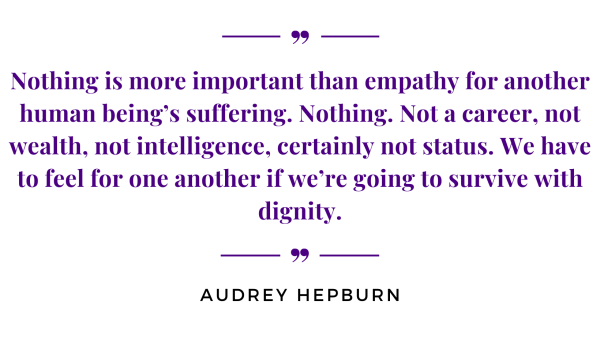
Close


The word “empathy” is cropping up everywhere nowadays from pop culture to board rooms to political debates. But what exactly is empathy? At its core, empathy is the ability to step into someone else’s experiences with the intent to understand their feelings and perspective.
With all that it encompasses, it’s no wonder that empathy plays a key role in leadership performance and business results – especially in today’s fragmented work environments.
The fact that empathy is important, playing a pivotal role in how satisfied employees are with their leaders and how leaders are viewed by upper management, is not new. However, it’s only recently been discovered how the impact of empathy has a much broader influence on the businesses bottom line. In a recent article published by Forbes entitled Empathy is the Most Important Leadership Skill According to Research, it was noted that empathy is important in all business areas “from innovation to retention”.
The root of empathy, and how it goes further than basic sympathy, all revolves around the why. Simply put, when a leader tries to understand why a team member feels a certain way, they are better positioned to help them. And in the uncertain times we are living in, this help is more necessary than ever, especially considering that a whopping 67% of people reported that their stress levels have increased during the pandemic.
You may be thinking, but stress is a natural part of life, isn’t it? Yes, but the impact of our collective stress overload is having negative consequences across the board and is reflected in our:
The decline in mental health is clear in the numbers with 57% of workers reporting increased anxiety, 54% report being emotionally exhausted and 53% of employees identifying as sad. Take a moment to really take in those numbers. In every category more than half of those surveyed are experiencing adverse effects on their mental health – how can that not be reflected in their work performance?
The importance of sleep is well known, and it’s no surprise that the quality of sleep is impacted by stress. This not only affects cognition, concentration, productivity and performance at work, but also negatively impacts our personal lives both with our partners and children.
As our stress levels rise, it becomes harder to think positively, which in turn can cause us to lash out at others or react with less patience. With rudeness at work on the rise, we are seeing negative impacts on performance, collaboration and customer experiences.
When looking at the negative impacts of stress at work, it begs the question of what can be done about it? The answer, my friend, is empathy.

The positive impact of empathy is widespread and includes:
– Improved collaboration
– Enhanced creativity and problem-solving
– Better customer service
– Strengthened loyalty
– An increase in innovation
– Higher levels of employee engagement
– Reduced turnover
– A feeling of inclusivity
– The ability to handle the demands of both work and life
– Boosts morale
– Improved mental health
While there is a genetic link to empathy, like any skill it can also be learned and developed. An article by Fast Company outlines six simple questions and phrases to help bring empathy into the workplace.
By asking someone how they are feeling, and actively listening to their answer, you are demonstrating that they are important. Giving space for a coworker to vent probably won’t solve their problem, but it will make them feel better about it.
By acknowledging bad news a coworker has received, whether it be they lost a client or a project isn’t going well, you’re showing that you care how they feel and are empathizing with their situation. It opens a conversational door and signals that you are happy to talk through the problem, which can in turn help them decide on next steps.
This choice of words creates a connection with a coworker by showing that you understand where they are coming from and acknowledging that you too would process the experience the same way. It’s such a simple phrase, but has the power to validate their feelings and nurture a feeling of community.
One of the biggest stressors at work is the workload itself. Everyone gets snowed under from time-to-time and nothing is more welcome than the offer of a helping hand. More often than not your coworker won’t take you up on the offer, but they will feel reassured and seen because of it.
By inviting someone to expand on an idea or topic they’ve touched on it lets them know that you value their thoughts and experiences. This sharing of information allows you to find commonality and better understand where they are coming from.
Everyone deserves that pat on the back after a job well done! It shows them that you feel as they do about their achievement and can even act as motivation for them when the next project hits some roadblocks.
Ultimately, leaders set the tone for the office and it’s their responsibility to show their teams that empathy is a priority. It may seem like a daunting task, but small changes can make all the difference.
At the start of the team meetings, have everyone go around the room and share something positive and negative that’s happened recently. These can be personal or work-related stories – the important part is that it acts as a safe place for sharing and allows people to feel more comfortable with one another.
Split into groups of two and have everyone choose a topic to discuss. Have one person speak about their topic, while the other actively listens, paraphrasing what the other is saying and prompting for more information when appropriate. This allows team members to practice their active listening skills, but also helps build trust between them.
Do you remember the dress that broke the internet?

To do this exercise, have everyone look at the picture and those that see black and blue go on one side of the room and those that see gold and white on the other. Then pair up people from opposite sides and have them talk about what makes them see the dress the way that they do. There is no right or wrong of course, but it helps people accept that the same thing can be interpreted differently by others.
Time and time again empathy has proven to be a skill that fosters strong relationships, builds trust between teams and increases overall productivity. More than that, leaders with empathy have been recognized as top-notch professionals who encourage collaboration and problem solving while also being someone others enjoy working with and for. With results like that, who wouldn’t want to embrace empathy?
While the information and activities above will help leaders take the first step towards creating a more empathetic environment, ultimately the best way it can be learned is by example. As leaders, it’s important to exemplify the impact empathy can have, showcasing it as not just a skill, but a better way to be.
Let’s join together and start a revolution of Empathy at work. Reach out to us to share your learnings and experience of bringing these tools to life in your workplace. To learn more about what you can be doing to up level your leadership team, feel free to reach out to team@desagloballeadership.com. We’d love to partner with and support you on your journey to inspire and activate your top talent and teams.
Enter your email below to get access to proven leadership tips and DEI best practices